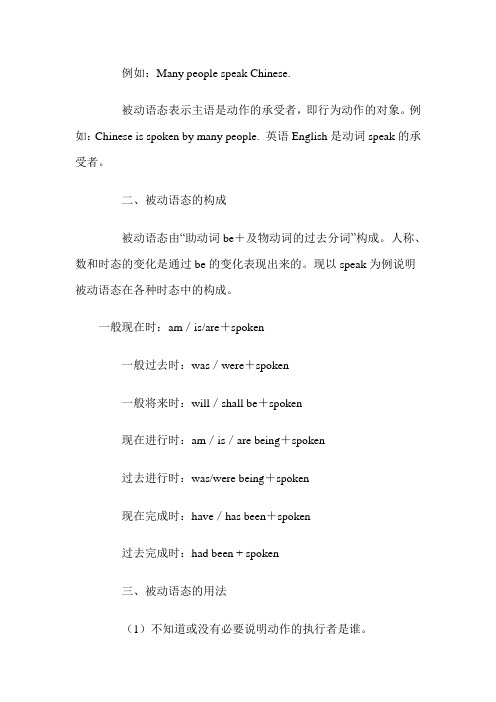八大时态、被动语态、动词非谓语形式专题
- 格式:doc
- 大小:67.00 KB
- 文档页数:11


英语中8种时态的主动语态和被动语态1、一般现在时(1)一般现在时表示没有时限的持久存在的动作或状态或现阶段反复发生的动作或状态,常和副词usually,often,always sometimes,every year, every week等连用。
例如:1)The moon moves round the earth..(2)在由after,until,before,once,when,even if(即使, 虽然),in case(conj.万一, 如果),as long as(和 ... 一样长),as soon as(conj.一 ... 就),the moment(一 ... 就 ..., 这一刻)以及if,unless(conj.除非, 如果不prep.除 ... 外)等引导的时间状语从句或条件状语从句中,通常用一般现在时代替将来时。
例如:1)I will tell him the news as soon as I see him.(3)某些表示起始的动词,可用一般现在时表示按规定、计划或安排要发生的动作,这类动词有:be,go,come,start,depart(vt.离开vi.离开, 死亡),arrive(vi.到达, 到来, 成功),begin(v.开始, 着手),leave(v.委托, 离开, 留给, 遗留, 遗赠, 听任n.许可, 准假, 告别vi.生出叶子)等。
例如:1)The plane leaves at three sharp(adv. 正好, (时间)准, 尖锐地).(4)在由why,what,where,whoever(pron. 无论是谁, 不管谁, 任何人),who,that,as 等引导的从句中,也常用一般现在时代替将来时。
例如:1)Free tickets will be given to whoever comes first.2.一般过去时英语中8种时态的主动语态和被动语态(1)表示过去某一特定时间所发生的、可完成的动作或状态,常与表示确切过去时间的词、短语或从句连用。

例如:Many people speak Chinese.被动语态表示主语是动作的承受者,即行为动作的对象。
例如:Chinese is spoken by many people. 英语English是动词speak的承受者。
二、被动语态的构成被动语态由“助动词be+及物动词的过去分词”构成。
人称、数和时态的变化是通过be的变化表现出来的。
现以speak为例说明被动语态在各种时态中的构成。
一般现在时:am/is/are+spoken一般过去时:was/were+spoken一般将来时:will/shall be+spoken现在进行时:am/is/are being+spoken过去进行时:was/were being+spoken现在完成时:have/has been+spoken过去完成时:had been + spoken三、被动语态的用法(1)不知道或没有必要说明动作的执行者是谁。
例如:Some new computers were stolen last night.一些新电脑在昨晚被盗了。
(不知道电脑是谁偷的)This bridge was founded in 1981.这座桥竣工于1981年。
(2)强调动作的承受者,而不强调动作的执行者。
例如:The glass was broken by Mike.玻璃杯是迈克打破的。
This book was written by him.这本书是他写的。
Your homework must be finished on time.你们的家庭作业必须及时完成。
四、主动语态变被动语态的方法(1)把主动语态的宾语变为被动语态的主语。
(2)把谓语变成被动结构(be+过去分词)(根据被动语态句子里的主语的人称和数,以及原来主动语态句子中动词的时态来决定be的形式)。
(3)把主动语态中的主语放在介词by之后作宾语,将主格改为宾格。
例如:All the people laughed at him.He was laughed at by all people.They make the bikes in the factory.The bikes are made by them in the factory.He cut down a tree.A tree was cut down by him.五、含有情态动词的被动语态含有情态动词的主动句变成被动句时,由“情态动词+be+过去分词”构成,原来带to的情态动词变成被动语态后“to”仍要保留。

八种时态主动语态被动语态一般现在时(经常,反复,爱好,特点,条件,真理) do; does am;is;are done一般过去时(过去发生的事,不强调现在的结果) did; -ed was;were done一般将来时(将要发生的事) will do will be done现在进行时(现在正在发生的事) am;is;are doing am;is;are being done过去进行时(当时正在发生的事) was;were doing was;were being done现在完成时(过去发生的事,强调现在的结果) have;has done have;has been done过去完成时(过去完成的事;过去以前发生的事) had done had been done过去将来时(过去将要发生的事) would do would be done八种时态:• He is always ready to help others. 一般现在时• She often came to help us in those days.一般过去式• He is doing his homework now. 现在进行时• At that time she was doing her homework.过去进行时• I've written an article.现在完成时• By the end of last month. We had reviewed four books 。
过去完成时• It is going to rain.一般将来时• I asked who was going there. 过去将来时一般现在时1.概念:经常、反复发生的动作或行为及现在的某种状况。
2.时间状语:always, usually, often, sometimes, every week (day, year, month…), once a week, on Sundays,3.基本结构:动词原形(如主语为第三人称单数,动词上要改为第三人称单数形式)4.否定形式:am/is/are+not;此时态的谓语动词若为行为动词,则在其前加don't,如主语为第三人称单数,则用doesn't,同时还原行为动词。

现在完成时意义:He has lived here for many years.2.强调后果/影响I have read the book .结构:时间状语:(1)since 的用法Since+时间点I have lived here since 2022.一段时间+ago I have lived here since two years ago.+从句(用一般过去时)常见句型:It is + 一段时间+since从句主句(完成时)+since(一般过去时)It is seven years since I met him last time.He has learned 2000 words since he went to school.(2)For+时间段We have known each other for five years.(3)already(用于肯定句中)/yet (用与否定句或疑问句中)just/everrecently( in recent years)before never等(just now是一般过去时的时间状语)I have just finished my homework.Have you ever seen one like this?(4So far /in the past few years等,表示:“目前为止”非延续性动词延续性动词非延续性动词延续性动词Borrow Keep Fall asleep Be asleep buy have Catch a cold Have a cold leave Be away Begin/start Be ondie Be dead open Be open Come (to)Be in/at close Be closed区分Have gone to去了没回Have been to去了回来(常与次数once/twice/基数词+times连用)Have been in在某地呆了多久例句:(1)You can’t see her because he has gone to Sibo.(2)He has been to Sibo twice.(3)He has been in this city for two years.备注:Here/there/home 不与介词连用。

系统学习语法非谓语动词的时态与语态变化语法非谓语动词是英语中的一个重要语法点,其时态与语态的变化是我们学习英语的基础。
本文将系统介绍语法非谓语动词的时态变化和语态变化,旨在帮助读者更好地理解和运用这一语法知识点。
一、时态变化1. 现在分词(Present Participle)的时态变化现在分词表示正在进行或同时发生的动作,其时态的变化相对简单,即在动词的原形(V1)后加-ing。
例如:- 我现在在读书。
I am reading now.2. 过去分词(Past Participle)的时态变化过去分词表示已经完成的动作或状态,其时态的变化需要根据不同的情况来判断。
- 若是规则动词,则在动词的原形(V1)后加-ed。
例如:- 我昨天洗了衣服。
I washed the clothes yesterday.- 若是不规则动词,则需要根据动词的不规则变化形式进行变化。
例如:- 我吃了晚饭。
I have eaten dinner.3. 动词不定式(Infinitive)的时态变化动词不定式表示目的或未来的动作,其时态的变化相对简单,即在动词的原形(V1)前加to。
例如:- 我打算明天去购物。
I plan to go shopping tomorrow.二、语态变化语态是英语中的一个重要语法点,包括主动语态和被动语态。
在非谓语动词中,语态的变化需要根据时态来确定。
1. 主动语态(Active Voice)的语态变化主动语态表示主语是动作的执行者,变化相对简单,即保持非谓语动词的原形形式。
例如:- 我正在听音乐。
I am listening to music.2. 被动语态(Passive Voice)的语态变化被动语态表示主语是动作的承受者,变化需要根据不同的时态来确定。
- 现在分词的被动语态变化为:be + being + 过去分词例如:- 她正在被教授指导。
She is being taught by the professor.- 过去分词的被动语态变化为:be + 过去分词例如:- 他被邀请参加宴会。
八大时态、被动语态、动词非谓语形式专题 1 八种时态的具体用法: (1) 一般现在时 表示现阶段经常或习惯发生的动作或存在的状态,或说明主语的特征。 ① 一般现在时句子中常有的时间状语:often,usually,sometimes,always,every (day等), once/twice,a (week等), on (Sunday等),never,in the (morning等)。如:They go to the Palace Museum once a year.(他们每年去一次故宫)/ They often discuss business in the evening.(他们经常在晚上商谈生意) ② 表示客观真理、事实、人的技能或现在的状态时句子里一般不用时间状语。如:The earth turns round the sun.(地球绕着太阳转)/ Light travels faster than sound.(光传播比声音快) ③ 表示十分确定会发生(如安排好的事情)或按照时间表进行的事情,用一般现在可以表达将来,句子中可以有将来时间。如:The train for Haikou leaves at 8:00 in the morning.(开往汉口的列车上午8点开车) ④ 在时间状语从句中(以when, after, before, while, until, as soon as等引导)和条件状语从句中(以if,unless引导),用一般现在时代替一般将来时,句子可以有将来时间。如:Please ring me up as soon as you arrive in Germany.(你一到德国就给我打电话) / If it rains tomorrow,we will have to stay at home.(如果明天下雨我们就只好呆在家) ⑤ 一般现在时用于倒装句中可以表示正在发生的动作,动词以come, go为主。如:Here comes the bus. (车来了) / There goes the bell.(铃响了)。 ⑥ 一般现在时常用于体育比赛的解说或寓言故事中。Now the midfield player catches the ball and he keeps it. ⑦ 人的心理活动和感官动作一般用一般现在时而不用现在进行时表达,常见动词有:like, love, hate, dislike, want, wish, hope, think(认为),understand, remember, forget, mean, need, hear, feel, see. 如:I think it is going to snow.(我想天要下雪了)/ I really hope you can enjoy your stay here.(我真的希望你愉快地呆在这儿)
(2) 一般过去时 表示过去某时发生的动作或状态,这种动作或状态可能是一次性,也可能经常 发生。 ① 表示过去具体时刻发生的一次性动作时,时间状语有:at (eight) (yesterday morning),(ten minutes) ago, when引导的时间状语从句。如:I got up at 6:00 this morning.(我是早上六点钟起床的)/ Little Tom broke the window at half past nine this morning.(小汤姆今天早上九点半把窗子打破了)/ When he went into the room,he saw a stranger talking with his father.(他走进房间时发现一个陌生人正和他父亲谈话) ② 表示过去一段时间内不知何时发生的一次性动作时,时间状语有:yesterday, last (year等), in (1998 等)。如:He came to our city in the year 2000.(他2000年来到我们市) ③ 表示过去一个阶段中经常发生的事情时,时间状语有:last„, in„, from„to„, for(10 years),often,usually, sometimes, always, never等。如:Mr Jackson usually went to evening schools when he was young. / Every day he went to the rich man and borrowed books from him. ④ 讲故事、对过去经历的回忆、双方都明白的过去事件等一般用过去时,而且经常省略时间状语。如:I happened to meet Rose in the street.(我正好在街上遇到露西)
(3) 一般将来时 表示将来某一时刻或经常发生的动作或状态。 ①一般将来时的时间状语有:tomorrow,this (afternoon),next (year),one day,now,soon, 八大时态、被动语态、动词非谓语形式专题 2 someday,sometime, in the future, when引导的从句等。 ② 用will构成的将来时,表示动作与人的主观愿望无关。“shall”用于第一人称,“will” 用于所有人称。如:I will graduate from this school soon.(我很快就要从这所中学毕业了)/ You will stay alone after I leave.(我走了之后你就要一个人过了) ③ “am/is/are going to+动词原形”表示打算或准备要做的事情,或者主观判断即将要发生的事情,而“am/is/are to +动词原形”表示安排或计划中的动作。如:A man told them that the woman was to give birth to the special baby.(有一个人告诉他们那个妇女就会生下那个特别的男孩)/ It’s going to rain soon.(天快要下雨了) ④ 表示一个人临时决定要做某事,可以用will表达。如:I will go to the lab to get some chemicals(化学药剂). So please wait until I return.(我要到化学实验室去取些药品,请等我回头) ⑤ 现在进行时、一般现在时也可以表示将来。(见相应时态) ⑥ shall和will 在口语的一些疑问句中相当于情态动词。Shall一般与第一人称连用,will与第二人称连用。如:Shall we go to the zoo next Saturday?(我们下周六去动物园好吗?)/ Will you please open the door for me?(替我把门打开好吗?) ⑦ “be to +动词原形”表示按照计划将要发生的事情。如:An angel came to tell her that she was to have this special boy.
(4)现在进行时 现在进行时表示现在正在进行的动作或是现阶段正发生而此刻不一定在进行的动作。 ① 现在进行时由“助动词be (am is are ) +现在分词”构成。 ② 现在进行时的时间状语有: now, this „, these„等,但经常不用。如:What are you doing up in the tree?(你在树上干什么?)/ I am writing a long novel these days.(我最近在写一本长篇小说) ③ 表示即将发生的动作,一般指近期安排好的事情。常见的动词有:come, go, stay, leave, spend, do等。如:I’m coming now.(我就来)/ What are you doing tomorrow?(你明天干什么?)/ He is leaving soon.(他就要走了) ④ 表示频繁发生或反复进行的动作,常与always等频度副词连用,以表示赞扬、不满或讨厌等感情色彩。如:He is always borrowing money from me and forgetting all about it some time later.(他老是向我借钱,过一些时候就忘得一干二净)
(5)过去进行时 过去进行时表示过去某一时刻或某阶段正在进行的动作。 ① 过去进行时由“was(第一、三人称单数)或were(第二人称单数和各人称的复数)+现在分词”构成。 ② 过去进行时的时间状语有:then, at that time, this time yesterday, at (eight) yesterday (morning),(a year) ago, 以及由when引出的时间状语从句。如:He was cooking supper this time yesterday.(昨天这个时候他正在做晚饭)/ The little girl was playing with her toy when I saw her.(我看到小女孩的时候她正在玩玩具) ③ 用于宾语从句或时间状语从句中,表示与主句动作同时进行而且是延续时间较长。句子中通常不用时间状语。如:She was it happen when she was walking past.(她路过时看到事情的发生)/ They sang a lot of songs while they were walking in the dark forest.(他们在黑暗的森林里走时唱了很多歌) ④ 也可以表示过去一个阶段频繁发生或反复进行的动作,常与always等频度副词连用,以表示赞扬、不满或讨厌等感情色彩。如:He was always borrowing money from me when he lived here.(他住在这里时老向我借钱)